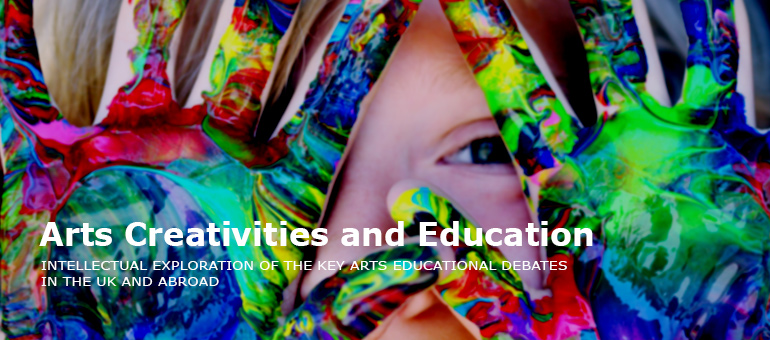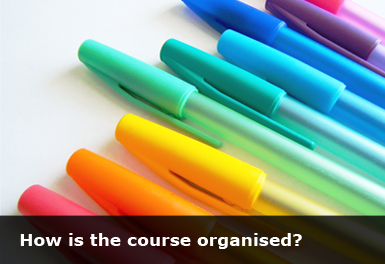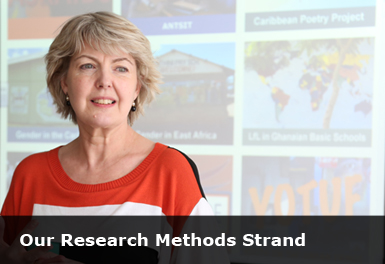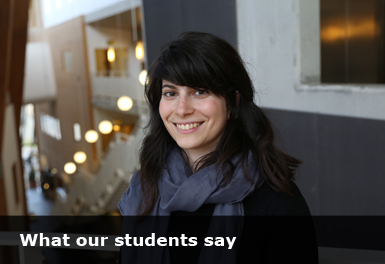
The research that I carried out not only informed my own practice but also contributed to contemporary educational debate and policy.
| Key Facts | |
|---|---|
| Route Co-ordinator: Tabitha Millett | Full-time Students Enrolled 2024-25: 13 |
| Open to: Full-time MPhil only | |
|
Please only submit the written task with your application, a research proposal is not required |
|
| Full-time deadline: 23/01/2026 | |
Overview of the course
The Arts, Creativity, and Education (ACE) thematic route offers students the opportunity to explore urgent themes in arts and education research taking place globally today. By ‘urgent’, we mean contemporary debates, practices, policy agendas and epistemic dialogues currently shaping the way art and education are practiced across a variety of contexts. These can include (but are not limited to):
- Art as mode through which to critique and experiment with new approaches to curriculum, pedagogy, policy and practice
- The role of arts in the critique of contemporary societies and social practices
- Queer and nonconforming arts for rethinking normative pedagogies
- Decolonial arts practices and matters of epistemic justice in education
- Artistic research and the role of practice in contemporary education research
- Imagining new environmental and ecological education practices
- Entangled futures of arts, education, and digital technologies
The course includes contributions from specialists in a range of disciplines, including performing arts, visual arts and design and technology. This course recognises that artistic practices can serve as an essential research tool in our respective fields and therefore makes available studio and performance facilities.
Term one and Term two
The ACE curriculum investigates ways of knowing with and through the arts while engaging critically with the politics of education. It traces lineages from white Western traditions through to decolonial, queering, new materialist, and critical pedagogical perspectives, opening up diverse approaches to contemporary arts and educational practice.
In the first two terms, students work with a range of specialists from across different arts fields who introduce varied approaches to researching through arts and education. This breadth of perspectives allows students to explore multiple methodologies and to reflect on the kinds of practices that best support their own research journeys.
Alongside these explorations, the curriculum foregrounds wider traditions of research in education. Students are encouraged to draw on situated and arts-based approaches as well as established practices in social research, fostering multi-registered ways of thinking, practicing, and writing. In doing so, the curriculum supports the development of innovative, critically engaged strategies for research in arts and education.
Term three
Students complete a Masters dissertation of their design.
Why choose us?
- Benefit from teaching by internationally renowned Faculty staff specialising in the Arts and Education research and practice
- Enjoy a contemporary range of theoretical frameworks and approaches to literature in the Arts
- Closely engage with other Faculty networks
- Join a unique and vibrant community of postgraduate students and researchers in Arts and Education
- Benefit from the experience of working with fellow students from all over the world
- Experience a teaching approach that encourages deep critical engagement with different research approaches
- Enjoy personalised support and mentoring through one-to-one supervision
- Gain knowledge and develop research skills to continue to a PhD
- Develop skills for employability across a range of institutions including academia, professional and community arts, teaching, government, museums and galleries (to name but a few)
- Conduct an independent research project of your design with the option of using arts-based methods
What does this course offer?
As well as providing a strong grounding in critical perspectives, this unique interdisciplinary course offers several distinctive elements which distinguish it from other courses on offer in other universities:
- Investigates key debates at the intersection of arts and education and encourages you to develop the knowledge and critical fluency to engage in these to create your approaches
- Encourages you to experiment playfully with your research interests both traditionally and through creative practice with your peers as part of a dynamic research group
- Fosters critically considered approaches to research that brings together theoretical, practice-based and policy-aware perspectives on the changing field of contemporary education
 How is the course organised?
How is the course organised?
Students on the MPhil course complete the course in one year and have teaching sessions throughout the week.
 Research Method Strand
Research Method Strand
Alongside these modules, you will benefit from Research Methods teaching.
This is taught across all Masters courses within the Faculty of Education, allowing you to interact with others on different routes.
It covers a broad range of social science research methods and is essential for Masters level understanding and critical engagement with the research literature in many specialist areas and in education more generally.
Through this strand you will acquire the skills necessary for designing, conducting, analysing, interpreting and reporting a research study for thesis.
 Who are the course team?
Who are the course team?
 Where do our students go?
Where do our students go?
Our graduates are leaders in the field of the arts, as artists, arts education leaders, teachers, policy makers and educational practitioners across a range of arts disciplines.
They have a wide choice of career options, including:
 What our students say
What our students say
For anyone with an interest in the relationship between education and the arts, I can’t recommend ACE more. The program has introduced me to a diverse array of theoretical approaches to arts education, deepened my practice as a drama facilitator, and reminded me that the arts are a powerful way of exploring the world—and all of this is done in the company of other brilliant artist-educator-researchers. I’ll be sad when the year ends!
ACE totally transformed my academic perspective, it enabled me to build on my ideas and previous experience in exciting ways I hadn’t previously imagined. The best thing about the course for me was the space it gave to explore, the diverse lectures and constant support of the tutors helped me delve into new academic territories to discover and develop my own interests.
This course offered me revolutionary insights into what creativity is and how creativity bridges education. In a sense, this MPhil program is a lifelong process for me to learn and explore, as the fundamental philosophy of it ‘intra-acts’ with many aspects of my personal development.
Having been a secondary art teacher for almost ten years, the ACE course instigated an in-depth, contemporary and challenging upheaval of my teaching practice. With ACE's strong focus on creative practices that work through, with, and among ethical considerations, I have returned to secondary teaching equipped with a theoretical framework fit for the teaching of art in the current time.
